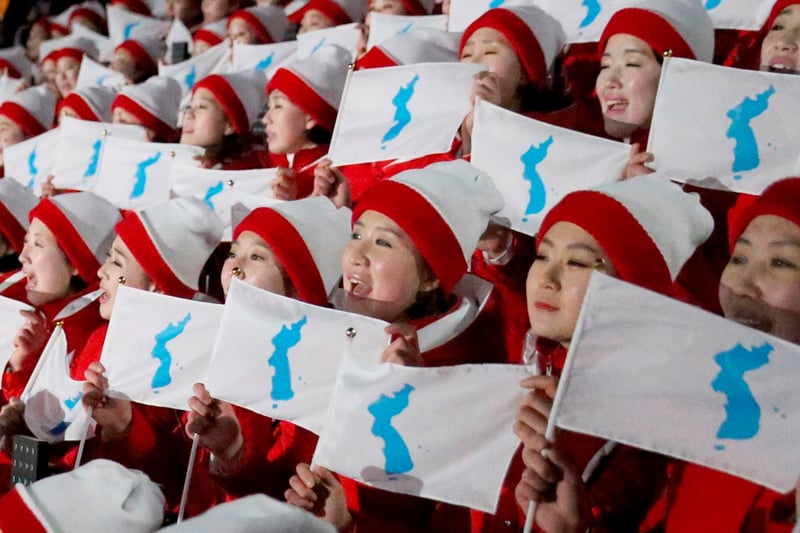With the 2018 “Peace Olympics” now history, will the Korean crisis return to a standoff of nuclear brinkmanship or shift to cheery notions of reunification and denuclearization? Will there be peace in our time on the Korean peninsula?
In the run-up to the Olympics North Korean dictator Kim Jong-un belligerently pronounced he had a “nuclear button” on his desk, heightening already strained tensions.
In the last two years, North Korea has fired over two dozen missiles and conducted three nuclear tests, with the express goal of developing a nuclear-armed missile that can target the U.S. mainland.
In response, U.S. President Donald Trump taunted Kim, calling him “little rocket man” and promising to rain down “fire and fury” and “totally destroy North Korea” if it threatened the United States with nuclear weapons.
Weaponized diplomacy
When South Korea last hosted the Olympics, the Summer Games of 1988, its northern neighbors were not allowed to cohost the spectacle. The North, in bitter retaliation, tried to frighten the world away by detonating a bomb on a South Korean passenger jet, slaughtering all 115 on board.
Now, three decades later, in a shrewd change of diplomatic tactics, the North launched an Olympic charm offensive, thereby weakening international support for President Trump’s strategy of tighter economic sanctions and diplomatic isolation.
Two countries, one team

A last-minute flurry of agreements made it possible for athletes from the two Koreas to compete under a single combined Korean banner. Going for a diplomatic gold medal, Kim Jong-un deployed to the Games his powerful and reclusive younger sister, Kim Yo-jong, to pose with the South Korean president for photographs and invite him to a summit in Pyongyang.
Weapons or food
North Korea is situated at the heart of the most vibrant economic region in the world. It has the globe’s second-largest economy on its border (China), the third-largest economy across the sea (Japan), and the 15th-largest economy to the south (South Korea).
Despite this, North Korea remains a poor, backward and hermetically sealed Cold War anachronism that maintains a million-man army and clings to nuclear weapons as both its greatest achievement and key to its long-term survival.
Sadly, as a recent Newsweek headline bluntly put it, “North Korea’s Kim Jong Un is starving his people to pay for nuclear weapons.” The North is one of the few industrialized nations in history to have suffered a famine that killed as much as 10 percent of the population in the late 1990s. The appalling effects of malnourishment will be evident for generations: the average 7-year-old boy in North Korea is 8 inches (20 centimeters) shorter and 22 pounds (10 kilograms) lighter than his counterpart in South Korea.
Shocking nuclear advances
Building on decades of tests, North Korea made startling technological developments in the past year, dramatically boosting ballistic missile ranges and increasing nuclear weapon yield. The U.S.-Korea Institute at Johns Hopkins University has estimated that Pyongyang will have enough material for as many as 100 nuclear weapons by the end of this decade.
Every previous diplomatic attempt to stop North Korea’s nuclear program has failed. “The longtime pattern of engagement with North Korea,” observed the Wall Street Journal in a March 7, 2018, editorial, is this: “it pushes ahead militarily, pauses, talks, reaps some economic rewards from the outside world for talking, consolidates its gains, and then resumes.”
Three generations of juche
North Korea is ruled by an opaque and reclusive dynasty built on a cult of personality. The three successive generations of Kims began with Kim Il-sung, who grew up in a nominally Christian household. After leading guerrilla forces against the Japanese in World War II, he was installed as Communist leader of North Korea by Soviet leader Joseph Stalin.
Kim then torched over 2,000 Buddhist temples and Christian churches and incinerated over 100,000 Christians.
“Kim was,” according to noted Korea expert Victor Cha, “replacing God with himself in the minds of North Koreans. Through destroying others, he made himself the Creator of everything material and spiritual in the North Korean state. Nothing existed before him. State propaganda thereafter referred to Kim as superior to Christ in love, Buddha in benevolence, Confucius in virtue, and Mohammed in justice” (The Impossible State, 2013, p. 73).
The Great Leader made his most lasting impact introducing a radical ideology of socialist self-reliance, or juche in Korean, which promoted political independence, economic self-reliance and military autonomy—such as North Korea’s nuclear program.
Is peace the goal?
Nicholas Eberstadt warned the U.S. Senate Foreign Relations Committee in 2017: “Along with its notorious variant of emperor worship, ‘Juche thought’ also extols an essentially messianic—and unapologetically racialist—vision of history: one in which the long-abused Korean people finally assume their rightful place in the universe by standing up against the foreign races [starting with Japan and America] that have long oppressed them, at last reuniting the entire Korean peninsula under an independent socialist state.”
“The real existing North Korean leadership (as opposed to the imaginary version some Westerners would like to negotiate with),” continued Eberstadt, “will never willingly give up their nuclear option. Never. Acquiescing in de-nuclearization would be tantamount to abandoning the sacred mission of Korean unification” (“To Neutralize the North Korean Threat, America Must First Understand the North Korean Regime,” National Review, Sept. 11, 2017).
Admiral Harry Harris, the top U.S. military officer in the Asia-Pacific, warned that “combining nuclear warheads with ballistic missiles in the hands of a volatile leader … is a recipe for disaster.”
The threat to the entire region is alarming. Japan’s Prime Minister Shinzo Abe declared that “a nuclear-armed North Korea is absolutely unacceptable.” Admiral Harry Harris, the top U.S. military officer in the Asia-Pacific, told an audience in Singapore that not only was Kim a “reckless dictator,” but warned that “combining nuclear warheads with ballistic missiles in the hands of a volatile leader … is a recipe for disaster” (Colin Kahl, Foreign Policy, “The United States Should Resolve to Avoid War With North Korea in 2018,” Dec. 27, 2017).
Gulag of the mind
The so-called hermit kingdom is also a suffocating prison state, strictly prohibiting the slightest domestic criticism. The population of 25 million is enslaved not just in action but in thought.
A 2014 report by a special United Nations commission on human rights in North Korea found that “there is an almost complete denial of the right to freedom of thought, conscience and religion.” The commission found the regime carries out crimes against humanity on a scale “that does not have any parallel in the contemporary world.”
Learning war every day
The Orwellian thought control stranglehold extends through every aspect of life. More than 40 films are produced each year by the state-run studios, and all depict the greatness of the Kim family and the awfulness of the outside world.
“In school,” according to Cha, “33 percent of the curriculum is devoted to the personality cult of Kim. … Children are taught that Kim gave them their clothes, toys, and books, and to love Kim more than they love their parents. They are taught that they can live without their parents but they cannot live without love for and undying loyalty to Kim Il-sung” (The Impossible State, p. 165).
North Korean schoolchildren learn grammatical conjugations of past, present and future by reciting “We killed Americans,” “We are killing Americans,” “We will kill Americans” (p. 7).
Saturated with state propaganda, nearly nine out of 10 defectors—those who are so disillusioned with their country that they risk their lives to escape—still self-identify as North Korean rather than as Korean or South Korean. The brainwashing is so thorough that 75 percent of them say that they still retain deep affection for the Kim dynasty (p. 10).
Prisons within a prison state
While daily life is harsh beyond measure, for those sentenced to reeducation in one of the brutal concentration camps, or kwalliso, conditions are “worse than death,” according to a former guard (p. 170). There are estimates of more than 200,000 political prisoners in this gulag system today, but an estimated 1 million others have already perished (p. 172).
Many are never told why they were arrested, but if the mandatory portraits of Kim Il-sung and Kim Jong-il are not properly dusted or are hung off-center, or if a person is caught humming a South Korean pop song, or complaining about the lack of merchandise in the state-run department store, then jail awaits (pp. 170-171).
A common cause of imprisonment is having a relative who defects. Punishment often extends for up to three generations after a defection (p. 175). Many are born in the camps and will die there.
A world held captive
Virtually the entire populace of North Korea is imprisoned by a tyrannical regime, cut off from much of the world around them.
The inspired Word of God shows us the startling bigger picture—that all of mankind has been deceived (Revelation 12:9) by the ruler of this current age, Satan the devil (2 Corinthians 4:4). Humanity is held captive and blinded by deceptions into loving this captivity. Mankind has been cut off from and not known the Creator God. As a result, mankind’s governments cannot work together, avoid war or find peace (James 4:1-2; Romans 3:16-17).
The gospel—meaning good news—found in the pages of your Bible shows that delivery from that deception, discontent, suffering and death is rapidly approaching as Jesus Christ prepares to return to earth (Revelation 19:15; 20:1-3). He will abolish human demagogues and dictators and revolutionaries and establish true peace (Isaiah 2:4; Psalm 22:27-28).
To learn more, download your free copy of our booklet The Book of Revelation: The Storm Before the Calm and sign up for our News & Prophecy Insights blog.





